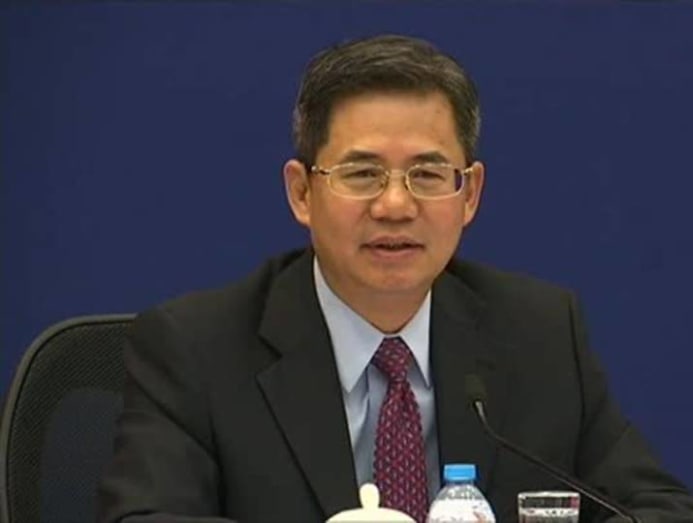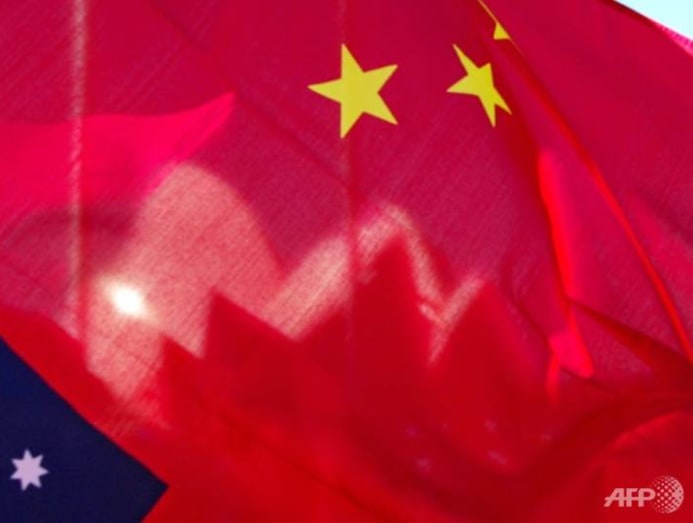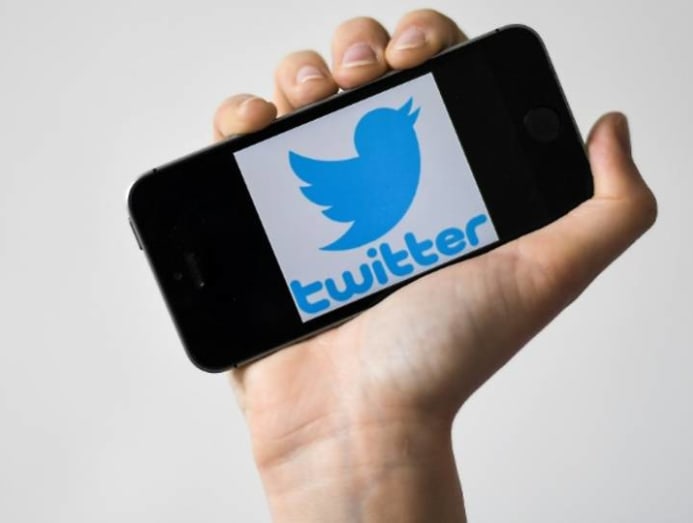Commentary: A pity China can’t seem to ditch its wolf warrior diplomacy
LONDON: In early on June, President Eleven Jinping called for a more "credible, loving and respectable" image of China.
While these comments suggested greater restraint from the more song of China's "wolf warriors" – diplomats, journalists and retrieve tankers who robustly defend People's republic of china'southward policies in public fora - their defensiveness has not subsided.
Leading Chinese English-language commentators continued to apply annoying language to defend Red china's policies and deflect perceived slights from the US and overseas.
Perchance Beijing continues to see its wolf warriors equally a useful, perhaps even necessary, rhetorical tool to further China'due south viewpoint and counter strange criticism.
Perhaps they run into them every bit an intractable part of a mosaic of strange policy tools available to Beijing, from slickly edited videos presenting a softer image of China explaining things similar the Five-Year Programme, to the harsh combative language of the wolf warriors attacking strange critics.

READ: Commentary: Chinese officials accept filled the Trump vacuum on Twitter
Just information technology is far from clear that these aggressive defenders of Red china's viewpoint improve Beijing's international continuing or overseas support of Chinese policy. Moreover, the patriotism stoked past these commentators is only feeding a tiger that Beijing is riding – a nationalism that tin can exist hard to control.
HOWL OF THE WOLF WARRIORS
Fifty-fifty though the term "wolf warrior" comes from a 2022 Chinese motion-picture show, wolf warrior diplomacy is cipher new for Chinese diplomats.
For decades, ambassadors, foreign ministry personnel and commentators have utilised acerbic language to sharply defend China's policies. In 2010, and so strange minister Yang Jiechi responded to criticisms from the US by telling Southeast Asian counterparts that "Red china is a large land and yous are small countries and that's but a fact."
In 1999, post-obit the Usa accidental bombing of the Chinese diplomatic mission in Belgrade, an op-ed in the People's Daily likened the United states to Nazi Germany.
In 1967, Chinese diplomats engaged in a deeply undiplomatic scuffle with police force outside the diplomatic mission in London, wielding blunt weapons and even an axe, amid tense Sino-British relations.
The electric current trend of wolf warrior diplomacy differs to these historical records in two key means: Medium and volume.
READ: Commentary: Some soul-searching needed in Prc's fresh push to make friends and influence people
Chinese diplomats today utilise globally popular English-linguistic communication apps to disseminate their bulletin.
This finer enables individual diplomats to both reach a wider audience and to tailor messaging to specific groups overseas.
The most popular wolf warriors use media banned in China, such as Twitter and Facebook, which let China'southward diplomats and commentators to assert themselves in public on a far more frequent ground, ensuring a steady stream of invective designed to push Cathay's narrative.
WOLF PACK
Wolf warriors are not merely more than prolific than in the past. There are also now many more than.
The number of Chinese diplomatic social media accounts has exploded in recent years. Co-ordinate to a May 2022 study past the Associated Press and Oxford Internet Institute, three quarters of the 270 active Chinese diplomatic profiles on Twitter joined since 2019.
Some are a office of new postings. Chinese ambassador to the Great britain, Zheng Zeguang, for instance, joined Twitter when he was posted overseas in his first high-level job.

Only ambassadors with previous ambassadorial experience have as well opened accounts subsequently assuming their current appointments.
China's ambassador to Iran, Chang Hua, was appointed in June 2022 and opened his Twitter account in October 2019. However, Chang as well was previously ambassador to the UAE and Republic of yemen, with no social media presence in those postings.
Similarly, Chen Weiqing, who was appointed ambassador to Saudi arabia in May 2019, opened his Twitter profile in July 2022 but had no social media presence in his prior posting in Iraq.
Finally, some of these new accounts announced to have been opened for diplomats who had been in the post for several years. Zhang Yiming was appointed ambassador to Namibia in 2022 simply didn't open his twitter account until September 2019.
READ: Commentary: Some soul-searching needed in People's republic of china'southward fresh push button to make friends and influence people
These suggest a coordinated attempt by Beijing to increase its diplomatic presence on major Western social media. The timing of this effort coincided closely with the protests in Hong Kong, when there was broad criticism of Beijing on social media.
Such accounts may attempt to defend Cathay against foreign criticism. Not all volition use deliberately provocative tactics to try to incite stance.
Key leading wolf warriors, such as Zhao Lijian, deputy director full general for the Ministry building of Strange Affairs Information Department, Hua Chunying, director general for the Information Department, and Hu Xijin, editor-in-master of the nationalist newspaper, Global Times, comment on strange affairs frequently and finer act as trolls at times. The first two take more than than 900,000 followers on Twitter.
READ: Commentary: People's republic of china's divide-and-conquer strategy isn't fooling anyone anymore
Other wolf warriors also spontaneously hitting out at strange powers sometimes in a haphazard fashion that tin can seem unbecoming of a diplomat. Li Yang, consul general in Rio de Janeiro, called Canadian Prime number Minister Justin Trudeau a "running domestic dog of the United states of america" in March, and recently mocked United states of america efforts to rescue survivors from a building collapse in Miami.
Such incidents reinforce the impression of a centrally directed move to push back rhetorically on Western social media platforms, through a greater and more assertive presence, mirroring Red china's foreign policy under Xi Jinping.
Yet non all diplomats use such indignant linguistic communication, suggesting that in that location is no articulate directive for all overseas representatives to exist so aggressive. The decentralisation of messaging to diplomats also allows them to target their criticisms to the audition where they are posted.
READ: Ride-hailing giant Didi says it stores all China user data in China
READ: Commentary: Jack Ma brought the wrath of Chinese regulators downwardly on Alibaba
Simply for the most strident of wolf warriors, garnering clicks through controversy helps them proceeds political capital through more than hits on their statements and allows them to demonstrate the fiercest defence force of Cathay and 11 Jinping.
EXTERNAL Effects
The effects of wolf warrior diplomacy have non necessarily been beneficial for Beijing. Some of the more incendiary comments and posts from wolf warriors have created diplomatic incidents.
In November 2020, Australia Prime number Minister Scott Morrison demanded an apology afterward Zhao Lijian posted a tweet depicting an Australian soldier belongings a bloody knife to the pharynx of a child.
Hua Chunying garnered negative headlines in March when she criticised accusations of forced labour in Xinjiang and used a "what-about" defence to betoken out the history of black slavery in the US.

The ascension of Red china's wolf warriors has too correlated with a rapidly worsening perception of China in a diverseness of other countries. A Pew Research Center survey from October 2022 highlighted this deterioration, with favourability ratings in countries such every bit the US and Australia dropping by 25 pct points or more.
In most major Western European and Northeast Asian countries, China'southward unfavourability ratings are now above seventy per cent, demonstrating a clear majority of people that meet the country in a negative low-cal.
A separate study by Yale in late 2022 suggested that the sharp language used by China's wolf warriors runs counter to Chinese interests. The written report ended that "aggressive messages that attempt to tear downwards the United States do non accept broad appeal", while "letters that highlight foreign aid move public opinion in People's republic of china's favour."
This all suggests that a more than belligerent rhetoric from Chinese wolf warriors and human foot soldiers has not only been unsuccessful in changing the hearts of its peers and rivals, but has too hardened overseas public stance against China, making it harder for foreign leaders to develop more than engaging policies towards China.
READ: Commentary: In People's republic of china, government fear wanting to arctic could fire off the adjacent youth revolution
NATIONALISM AND STABILITY
Even with these negative effects, Beijing is unlikely to rein in its wolf warriors anytime presently.
Domestically, the wolf warriors play a useful function. They demonstrate to a Chinese audience that Beijing is more powerful and confident, and as a upshot willing to push button back confronting international criticism.
In a land where the national narrative has been forged past the Chinese Communist Political party around the concept of a "century of humiliation", when Red china was forced to succumb to overseas interest and lost territories such every bit Hong Kong and Macau, such forceful messages present a stronger image of Cathay.
These messages reflect the nationalist rhetoric that is often used on China's social media sites, where patriotic users will highlight wolf warrior statements or replicate the sentiment.

Yet, the nationalism this stokes poses risks for Beijing in non merely suppressing criticality from the national discourse, but as well creating a patriotism that can be difficult to control.
In 2012, nationalist protests against Japan's nationalisation of three minor islands in the East Red china Ocean were initially encouraged by Beijing as a public form of discontent.
Merely the protests got out of manus and became fierce, leading to a crackdown by the government. While impairment was relatively limited, it demonstrated that nationalism is a force that can be difficult to incorporate.
Such nationalism can lead to Beijing having to mitigate damaging diplomatic furnishings – in June, "patriotic" Weibo influencers branded Chinese academics who received Japanese government funds equally traitors, requiring the strange ministry to underline the "understanding, trust and deeper friendship" to be gained through such programmes.
READ: Commentary: China's COVID-19 successes - credible at home, not so much abroad
In fact, there are signs Beijing may now recognise some of the impairment wolf warriors do, with the Wall Street Journal reporting in late June that the Foreign Ministry is drafting guidelines for diplomats on the use of Twitter.
But ultimately China'southward wolf warriors are an extension of China's more believing foreign policy nether Xi: A vocalization to its policies that are hither to stay.
It's a pity the wolf warriors will keep baring their teeth and snarling at foreign critics, when it could be more helpful to listen to some overseas appraisals and meet how to apply a amuse offensive.
Christian Le Miere is a foreign policy adviser and the founder and managing manager of Arcipel, a strategic advisory firm based in London.
Source: https://cnalifestyle.channelnewsasia.com/commentary/commentary-pity-china-cant-seem-ditch-its-wolf-warrior-diplomacy-275796
0 Response to "Commentary: A pity China can’t seem to ditch its wolf warrior diplomacy"
Post a Comment